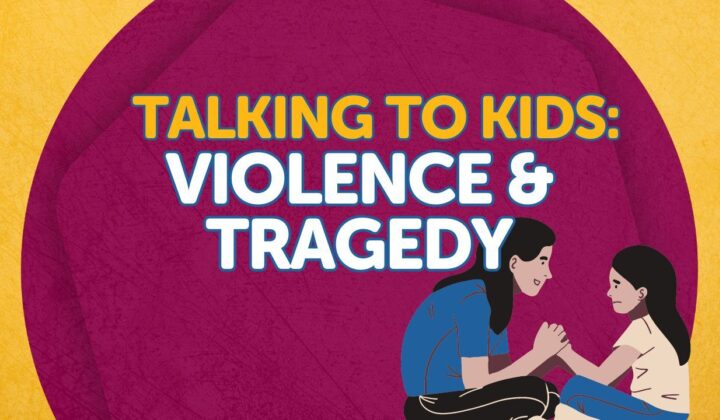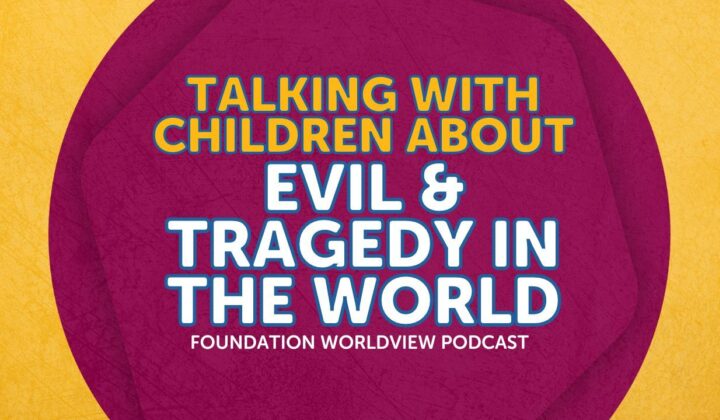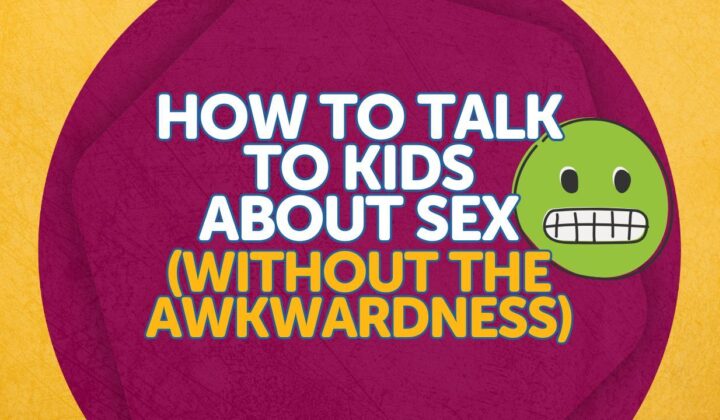Learn more about the journey that led to us equipping kids to carefully evaluate every idea they encounter.
Meet members of our team who have contributed to curriculum development.
Hear from real users of the Foundation Curriculum.
Learn what we believe about God, Jesus, Scripture, and more.
How and When to Talk to Your Child About Abortion
Hello, friends. Today’s podcast question is a heavy one—a sad one—but it’s an important conversation we need to have. The question is:
“When is the right time to talk with my child about abortion, and how can I explain it in developmentally appropriate and biblically accurate terms?”
This question really has two parts: When should we have the conversation, and how should we approach it?
Now, I know this isn’t a conversation any of us look forward to having with our children. Abortion is a heartbreaking and grievous sin—one that our nation has committed for decades. But because it’s so prevalent, it’s a conversation we must have.
So that’s what we’re diving into today on the Foundation Worldview Podcast, where we equip you to help the children in your care carefully evaluate every idea they encounter and understand the truth of the biblical worldview.
When Should I Talk to My Child About Abortion?
Abortion is one of those topics many Christian parents try to shield their children from. That’s understandable—after all, it involves the killing of innocent human life. But since abortion is legal and widespread in our culture, we need to talk about it with our kids. And we need to present it as what it is: a corruption of God’s beautiful design for life.
So when is the right time to start this conversation?
I believe around the age of 10 is generally a good starting point. Some children, depending on their development and what they’re exposed to, might be ready as early as 8 or 9. Others might need to wait until they’re closer to 11. But it’s important that we have this talk before they’re exposed to the topic by someone else—whether that’s through friends, media, or even conversations at church.
From personal experience, I know that by the time I was 12, I had heard about abortions through conversations involving friends and older siblings. Even if your child is homeschooled, they’ll likely encounter this topic through relationships at church or elsewhere. And we want our voices—the voices of the people God has placed in their lives—to be the ones guiding them through it.
What Foundation Do They Need First?
Before we explain abortion, we need to make sure our children understand God’s good design for sex and reproduction. That understanding is essential—it helps frame abortion as a distortion of something good, rather than a topic floating out in isolation.
If you haven’t yet had the first of many sex talks with your child, I recommend our miniseries called “The Talk"...Made Easy. It’s three short videos (all under 10 minutes) that you can either watch on your own to prepare, or view together with your child. We say the uncomfortable things so you don’t have to start from scratch.
-
The first video covers male and female anatomy.
-
The second explains the basics of sex.
-
The third walks through reproduction.
You can find the whole series, "The Talk"...Made Easy, for just $15.
How Do I Talk to My Child About Abortion?
Once your child understands God’s good design for sex, marriage, and family, you can begin this difficult but essential conversation. Here’s how to walk through it in a developmentally appropriate and biblically grounded way:
1. Start with God’s Good Design
Begin by reviewing that God created sex to be enjoyed within marriage and that this union often leads to children. Emphasize the blessings of family:
-
Relationships between family members
-
Shared meals and fun memories
-
Learning about God and serving others together
Invite your child to reflect on what they love about being part of your family. If you’re watching this episode on YouTube, feel free to drop those blessings in the comments.
2. Explain How Sin Corrupts God’s Good Design
If your child has already gone through our God’s Good Design curriculum, this will be a review. That curriculum lays a biblical foundation for understanding God’s design for gender, sexuality, marriage, and family—and the ways sin corrupts it.
If they haven’t gone through the curriculum, and they’re over age 10, it may be a bit young for them developmentally. In that case, I recommend walking them through the following Scripture passages:
-
Genesis 2:16–17
-
Genesis 3:17
-
Romans 5:12
-
Romans 3:23
-
James 1:14
-
Romans 6:23
Talk through how sin entered the world and corrupted what God created to be good.
3. Introduce the Concept of Abortion
Now that the groundwork is laid, explain how sex, when taken outside of marriage, can still result in the creation of a child. But often, when people have sex outside of the covenant of marriage, they’re not thinking about giving—only about what they can get. So when pregnancy occurs, their reaction may be selfish or fearful.
Some people feel overwhelmed or scared about raising a child on their own. Others simply don’t want a child. Instead of choosing to love and care for the baby, they choose abortion.
This is when you can say, very gently but truthfully, that abortion is the killing of a baby in the womb. Though heartbreaking, this is something that is legal in our country, and there are even doctors who will help women do this.
Make it clear: this is a sin against both God and the child. But it’s not a new sin.
4. Show the Biblical Parallel in Leviticus
You can point to Leviticus 20:1–5, where God commands Israel not to offer their children to Molech, a false god. The Canaanites would sacrifice already-born children out of fear or selfishness—either to gain something (like rain for crops) or to avoid something (like punishment from a god).
It’s eerily similar to abortion today. People sacrifice their children for convenience or out of fear. And just like in Canaan, it’s a tragedy.
5. Affirm the Value of Every Life
Now turn to Psalm 139:13–16 and read it together:
“For You formed my inward parts;
You knitted me together in my mother’s womb.
I praise You, for I am fearfully and wonderfully made…”
Talk about how even children conceived outside of marriage are good gifts from God—fearfully and wonderfully made. God knows every one of their days before they begin.
6. Let Them Ask Questions and Grieve
At this point, your child may need time to process. One of my friends shared this with her 8- or 9-year-old son, and he was heartbroken. He sobbed and said, “I thought it was illegal to murder people in our country.” That response? It’s exactly right. Our children should grieve when they learn what abortion is.
Let them ask questions. Comfort them. Pray with them. Thank God for the gift of life and ask Him to open eyes and change hearts.
7. Show Them How to Be Pro-Life
Help your child understand that they can respond—in prayer and in action.
-
Pray regularly that abortion would become illegal and that people would see children as a gift.
-
Support crisis pregnancy centers in your area.
-
Talk about donating or fundraising—maybe through a lemonade stand or a baby bottle campaign.
-
If you have older children, attend a pro-life rally together to demonstrate that life matters.
Closing Thoughts
This conversation will never be “light,” but it can be full of truth, grace, and hope. We don’t want to introduce this too early, but we also don’t want to be too late. And when we have it, we must ground everything in:
-
God’s good design
-
The corruption of sin
-
The value of every human life
-
And the biblical call to love what God loves
If you have a question you'd like me to answer on a future episode of the Foundation Worldview Podcast, visit FoundationWorldview.com/podcast.
As always, my prayer is that—no matter your circumstances—you and the children God has placed in your care would trust that He is working all things together for your good, using every conversation to shape you more into the image of His Son.
See you next time.
Related Posts and insights

How to Talk to Kids About Violence and Tragedy
Today's question says, "Should we talk about violence such as mass shootings to pray for the grieving families and ask for protection? My girls are six and seven. We do prayer requests at the end of Bible time. At their age, would that cause unnecessary fears and anxiety, or is it good that they know about it?"

Talking to Children about Evil and Tragedy in the World
Today's question says, "With all of the school shootings and other evil things that happen around us, how do you recommend talking with children about them? What age do you think is appropriate and how do you best frame this to point to God?"

How to Talk to Kids About Sex (Without the Awkwardness)
When should you talk to your kids about sex? What should you say, and how can you bring it up naturally? In this episode of the Foundation Worldview Podcast, Elizabeth Urbanowicz provides a framework for having age-appropriate conversations about body parts, the mechanics of sex, and reproduction—all while grounding the discussion in a positive, biblical perspective. Learn how to create a safe and open environment where your children can ask questions and receive clear, truthful answers from you.



